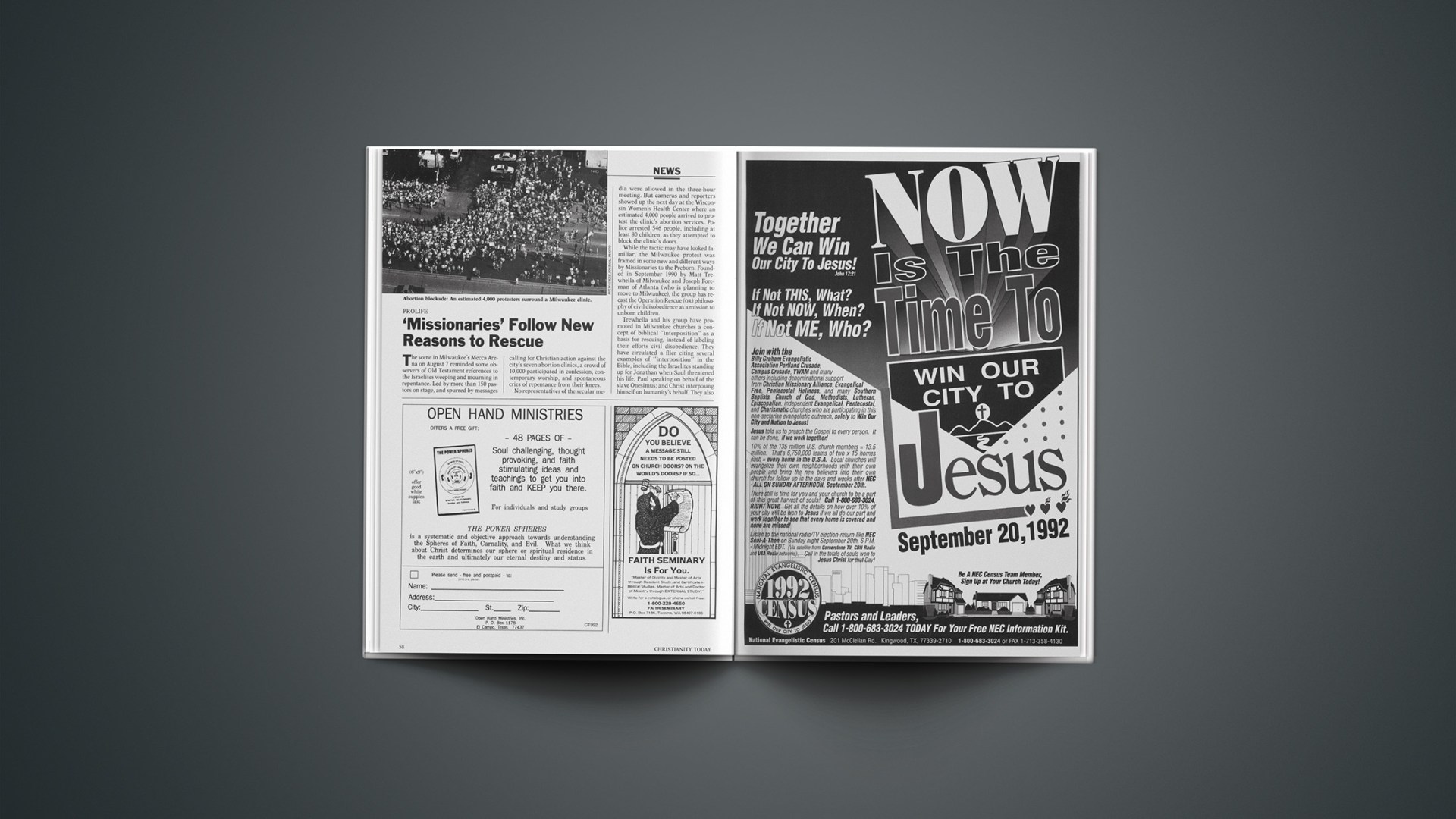The scene in Milwaukee’s Mecca Arena on August 7 reminded some observers of Old Testament references to the Israelites weeping and mourning in repentance. Led by more than 150 pastors on stage, and spurred by messages calling for Christian action against the city’s seven abortion clinics, a crowd of 10,000 participated in confession, contemporary worship, and spontaneous cries of repentance from their knees.
No representatives of the secular media were allowed in the three-hour meeting. But cameras and reporters showed up the next day at the Wisconsin Women’s Health Center where an estimated 4,000 people arrived to protest the clinic’s abortion services. Police arrested 546 people, including at least 80 children, as they attempted to block the clinic’s doors.
While the tactic may have looked familiar, the Milwaukee protest was framed in some new and different ways by Missionaries to the Preborn. Founded in September 1990 by Matt Trewhella of Milwaukee and Joseph Foreman of Atlanta (who is planning to move to Milwaukee), the group has recast the Operation Rescue (OR) philosophy of civil disobedience as a mission to unborn children.
Trewhella and his group have promoted in Milwaukee churches a concept of biblical “interposition” as a basis for rescuing, instead of labeling their efforts civil disobedience. They have circulated a flier citing several examples of “interposition” in the Bible, including the Israelites standing up for Jonathan when Saul threatened his life; Paul speaking on behalf of the slave Onesimus; and Christ interposing himself on humanity’s behalf. They also cite the church father Ambrose, who defied the Christian Emperor Theodosius by barring him from church until he repented of a public sin, and Revolutionary War-era ministers who supported America’s break with England.
For more than a year, Trewhella and about 16 other “missionaries,” who draw financial support from local churches, daily blocked the doors of a Milwaukee abortion clinic. When they were arrested, they served their time ministering to other prisoners. Trewhella says he has led several to the Lord. When the missionaries were released, they would return immediately to block the clinic again. Eventually, the clinic went bankrupt.
Local Pastors
Their efforts, however, seemed to be flagging, until this summer’s campaign. While they were joined by a few out-of-town rescuers, it was local churches that began to participate in the rescues and evening gatherings, Trewhella says. Their numbers multiplied quickly, and a group of about 100 pastors called for the solemn assembly.
That, says Trewhella, is what makes this effort so different from other large-scale rescue efforts, such as those led by Operation Rescue in Wichita, Kansas, and Buffalo, New York.
“What will make Milwaukee different is that the pastors are leading—literally—and also because there is a theological foundation being laid to what we are doing. [Our efforts] are being presented as ministry and not just some flash in the pan.”
Despite the new rationale for rescuing, some evangelical leaders in the city have chosen to remain separate from the efforts. Chief among them is Stuart Briscoe, pastor of Elmbrook Church in suburban Milwaukee, which has a regular adult attendance of 5,000. Briscoe was not available for comment to CT. But senior associate pastor Mel Lawrenz says this summer’s events have caused a lot of “heated discussions” in their church, whose pastors have chosen not to endorse the rescues.
“We have communicated concerns about it,” Lawrenz says. “And then we have told individuals they will have to make up their own minds about it.”
Elmbrook Church has been a big supporter of sidewalk counseling and has opposed abortion actively for 15 years, Lawrenz says. “The question,” Lawrenz asks, along with many other prolife Christians, “is ‘What is the long-term effect of these actions on public opinion and the availability of abortion?’ ”
By Joe Maxwell in Milwaukee.










